An amplifier board is the backbone of any audio system, providing the power and efficiency needed to boost sound signals for clearer and louder output. Whether you’re assembling a home theater, building a car audio system, or designing a DIY Bluetooth speaker, the amplifier board plays a critical role in delivering top-quality audio. With advancements in technology, amplifier boards have become more compact, affordable, and efficient, making them a popular choice for both professionals and hobbyists.
What Is an Amplifier Board?
An amplifier board, often referred to as an amplifier module or audio amplifier circuit, is an electronic device that amplifies low-power audio signals to a level suitable for driving loudspeakers. These boards come in various configurations, depending on their power rating, audio channel support (mono, stereo, or multi-channel), and input compatibility.
The core function of an amplifier board is to enhance the audio signal from the source (like a smartphone, computer, or audio player) before it reaches the speakers. Without amplification, the audio signal would be too weak to produce audible sound at high volumes.
Types of Amplifier Boards
There are several types of amplifier boards available on the market, each catering to different needs:
- Class A Amplifiers: Known for their high sound quality but low efficiency. They are typically used in audiophile-grade equipment.
- Class B Amplifiers: More efficient than Class A but can suffer from crossover distortion.
- Class AB Amplifiers: A blend of Class A and B, these are widely used due to their balance between performance and efficiency.
- Class D Amplifiers: Highly efficient and compact, Class D amplifiers are commonly used in portable speakers and car audio systems.
Each class has its strengths and is chosen based on the application, power requirements, and desired audio quality.
Key Features to Look For
When selecting an amplifier board, it’s important to consider the following features:
- Power Output: Measured in watts, this indicates the strength of the audio signal the board can deliver to the speakers.
- Number of Channels: Boards are available in mono, stereo, and multi-channel formats to suit different speaker setups.
- Input Options: Compatibility with audio sources such as AUX, Bluetooth, USB, and RCA inputs is crucial for flexibility.
- Efficiency: Higher efficiency means better power usage and less heat generation.
- Protection Features: Overvoltage, overheating, and short-circuit protection ensure the longevity of both the board and connected devices.
Applications of Amplifier Boards
Amplifier boards are used in a wide range of applications, from personal projects to professional audio setups. Some common uses include:
- DIY Audio Systems: Many enthusiasts build custom speaker systems using amplifier boards, thanks to their ease of integration and affordability.
- Car Audio Upgrades: Replacing or enhancing a car’s factory sound system often involves installing a powerful amplifier board.
- Home Theater Systems: Amplifier boards are used to drive multi-channel surround sound systems for a cinema-like experience at home.
- Portable Bluetooth Speakers: Compact Class D amplifier boards are ideal for powering wireless speakers while maintaining battery efficiency.
Benefits of Using Amplifier Boards
One of the major advantages of using an amplifier board is its amplifier kit. These boards are compatible with a wide range of speakers and input devices, making them ideal for various audio applications. They also offer excellent customization options for those who want to fine-tune their audio experience.
Additionally, modern amplifier boards are cost-effective and come with built-in safety features, ensuring reliable performance without risking damage to your components. As a result, they are a great choice for both newcomers and experienced audio engineers.
Conclusion
An amplifier board is an essential component in any quality audio system, transforming weak input signals into powerful, clear output that can fill a room. Whether you’re an audio enthusiast, a DIY hobbyist, or a professional installer, investing in a good amplifier board can significantly enhance your sound experience. From compact Class D modules to high-performance Class AB boards, there’s an amplifier board suited for every application.

